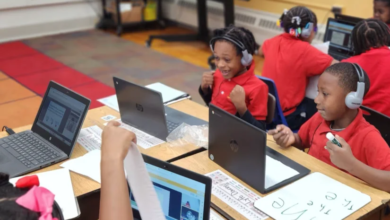Gen Z Teachers Are Ready To Reinvent Education. Schools Need To Catch Up – The 74


uaetodaynews.com — Gen Z Teachers Are Ready to Reinvent Education. Schools Need to Catch Up – The 74
Get stories like this delivered straight to your inbox. Sign up for The 74 Newsletter
The teaching profession is facing historic lows in both morale and retention across the nation. From falling student reading scores to exhausted teachers leaving classroomsAmerica’s schools face immense hurdles. Yet amid these challenges, a new generation of educators is stepping forward — driven by purpose, community and an unshakable belief that schools can be places of possibility.
Gen Z educators, born between the late 1990s and early 2010s, are entering classrooms with fresh energy and an innovative approach. They are digital natives and are eager to leverage technology thoughtfully. They bring a keen understanding of student needs because they were students themselves recently. They are naturally inclined to collaborate, provide more choice and individualized learning in their classrooms, and work alongside students and families with more frequent communication and care.
That combination makes Gen Z teachers the type of talent that education needs right now. It also means that schools must adapt if they hope to keep them.
For 35 years, Teach For America has welcomed thousands of new educators into classrooms. Gen Z stands out. They aren’t looking for a job — they’re seeking a mission. Research shows Gen Z deeply values equity and social change in a career. When they decide to pursue teaching as a career, they are intentionally choosing service. But that sense of purpose won’t sustain them if the policies and practices in their schools and districts don’t match their values and needs. If schools want to attract and retain Gen Z teachers, they must create conditions that align with their values: connection, community, mentorship, growth, flexibility and well-being.
Gen Z values belonging. Many entered the workforce after years of isolation during the pandemic, and they crave relationships with colleagues and leaders who see and support them. Schools should pair every new teacher with an experienced mentor, create ample opportunities for learning and collaboration with colleagues, and build school cultures that encourage open dialogue about challenges and wins. Community isn’t a bonus — it’s what keeps young teachers from feeling alone and leaving the profession.
This generation also expects to grow in their careers. They want to know how they can expand their impact beyond their first classroom — whether by becoming instructional coaches, policy advocates or school leaders. Districts should create transparent development tracks, fund leadership fellowships and make ongoing training accessible and relevant. When teachers can see a future for themselves in education, they stay longer and grow into leaders who have a greater impact on student learning.
Gen Z teachers are creators. They use technology intuitively and want to leverage it to help students thrive. Schools should invite them to pilot new tools, design lessons that use artificial intelligence responsibly and help shape digital learning policies. Flexibility in scheduling, hybrid professional development and collaborative planning time also shows trust in teachers’ professionalism and creativity.
Having spent my career coaching first-time teachers, I’ve seen how powerful it is when principals, instructional coaches, mentors and even district staff listen to their ideas. During the pandemic, the youngest educators became the experts in virtual learning. Today, many of those same teachers are leading conversations about AI in the classroom and shaping the future of instruction.
For example, through TFA’s Reinvention Labteachers and staff come together to explore how innovation and technology can close opportunity gaps. Gen Z educators are leading the way in exploring how to use AI and digital tools to make learning more engaging. This collaboration not only builds confidence for Gen Z teachers; it equips veteran educators with new tools to reinvigorate their teaching in an AI-driven future.
Lastly, Gen Z has been refreshingly vocal about one thing older generations often downplayed: mental health. They want to serve students well without sacrificing themselves in the process. This isn’t a sign of weakness — it’s wisdom. Teaching has always been demanding, but today’s educators face unprecedented emotional strainciting issues like increasing student behavior challenges and growing workloads as key factors causing burnout.
Schools and districts can respond not only by addressing the root causes behind burnout, but by implementing new wellness-focused policies. They can offer access to free or low-cost therapy and counseling, either directly or through expanded benefits, and build wellness days into the academic calendar that are genuinely restorative — not just “catch-up” time. They can provide time for teachers to meet in small groups, where they build relationships, discuss shared experiences and challenges, and brainstorm solutions. Forward-thinking districts are even piloting mental-health stipends that teachers can use for gym memberships, mindfulness apps or co-pays for counseling. These ideas may seem small, but collectively they signal that teachers’ well-being matters as much as student achievement — and that sustainability is part of professionalism.
Schools and districts that ignore this moment risk losing an entire generation of talent. Culture-building, mentorship and leadership development may once have been considered extras, but today they are essentials. Retaining passionate educators requires redesigning the experience of teaching itself, making those in profession feel more connected to fellow educators and supported by schools.
Investing in recruiting and retaining Gen Z teachers is investing in the next generation of educational leaders. These teachers will drive innovation, strengthen student outcomes and help communities imagine what’s possible. They’re showing up ready to serve. It is now up to education leaders at every level — in schools, district offices and state departments of education — to embrace and empower Gen Z educators in the classroom. Doing so will not only help address the teaching shortage, it will drive changes in teaching and learning that help schools better prepare students for their futures.
Did you use this article in your work?
We’d love to hear how The 74’s reporting is helping educators, researchers, and policymakers. Tell us how
!function(f,b,e,v,n,t,s){if(f.fbq)return;n=f.fbq=function(){n.callMethod?
n.callMethod.apply(n,arguments):n.queue.push(arguments)};if(!f._fbq)f._fbq=n;
n.push=n;n.loaded=!0;n.version=’2.0′;n.queue=();t=b.createElement(e);t.async=!0;
t.src=v;s=b.getElementsByTagName(e)(0);s.parentNode.insertBefore(t,s)}(window,
document,’script’,’https://connect.facebook.net/en_US/fbevents.js’);
fbq(‘init’, ‘626037510879173’); // 626037510879173
fbq(‘track’, ‘PageView’);
Disclaimer: This news article has been republished exactly as it appeared on its original source, without any modification.
We do not take any responsibility for its content, which remains solely the responsibility of the original publisher.
Author: Anajah Philogene
Published on: 2025-10-31 18:30:00
Source: www.the74million.org
Disclaimer: This news article has been republished exactly as it appeared on its original source, without any modification.
We do not take any responsibility for its content, which remains solely the responsibility of the original publisher.
Author: uaetodaynews
Published on: 2025-10-31 18:12:00
Source: uaetodaynews.com




